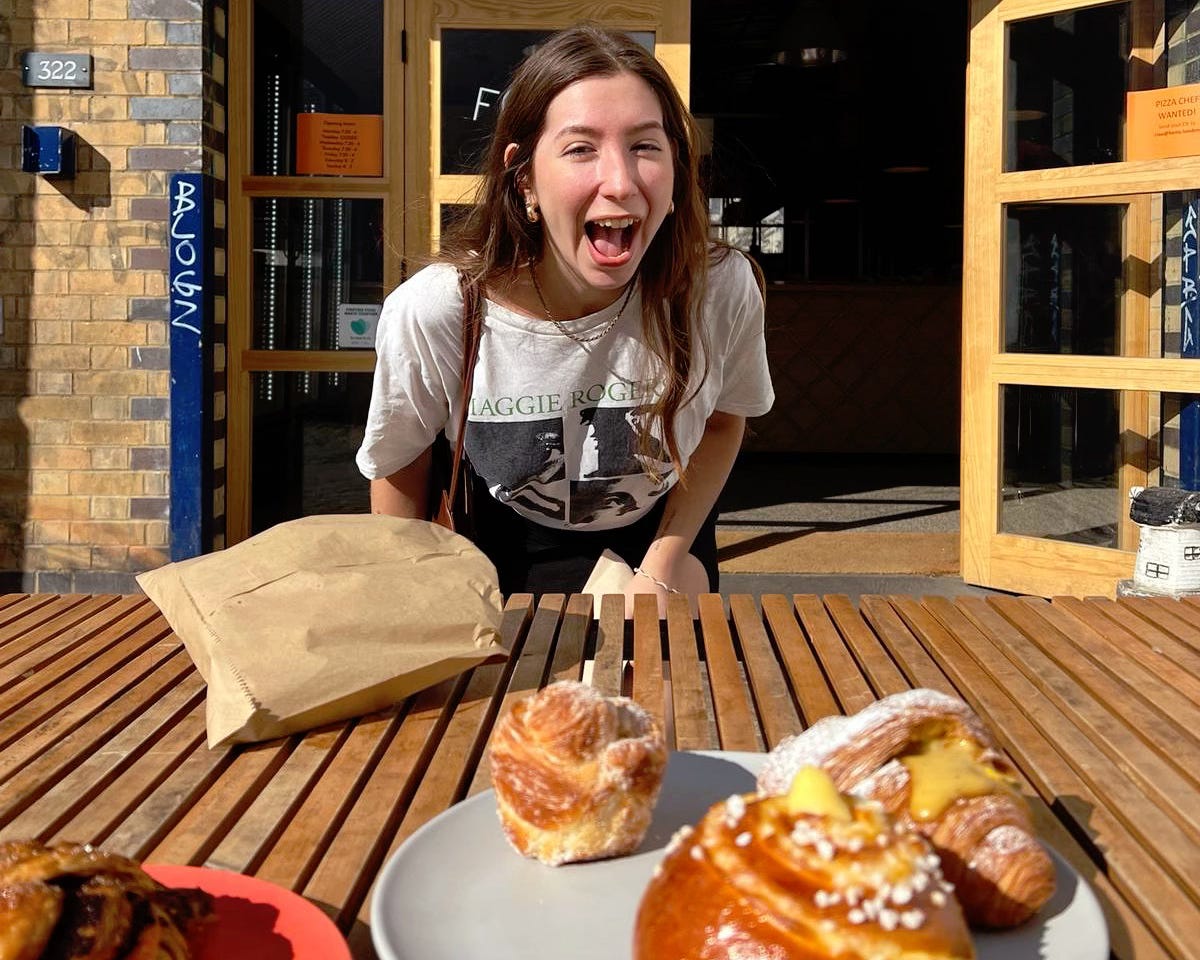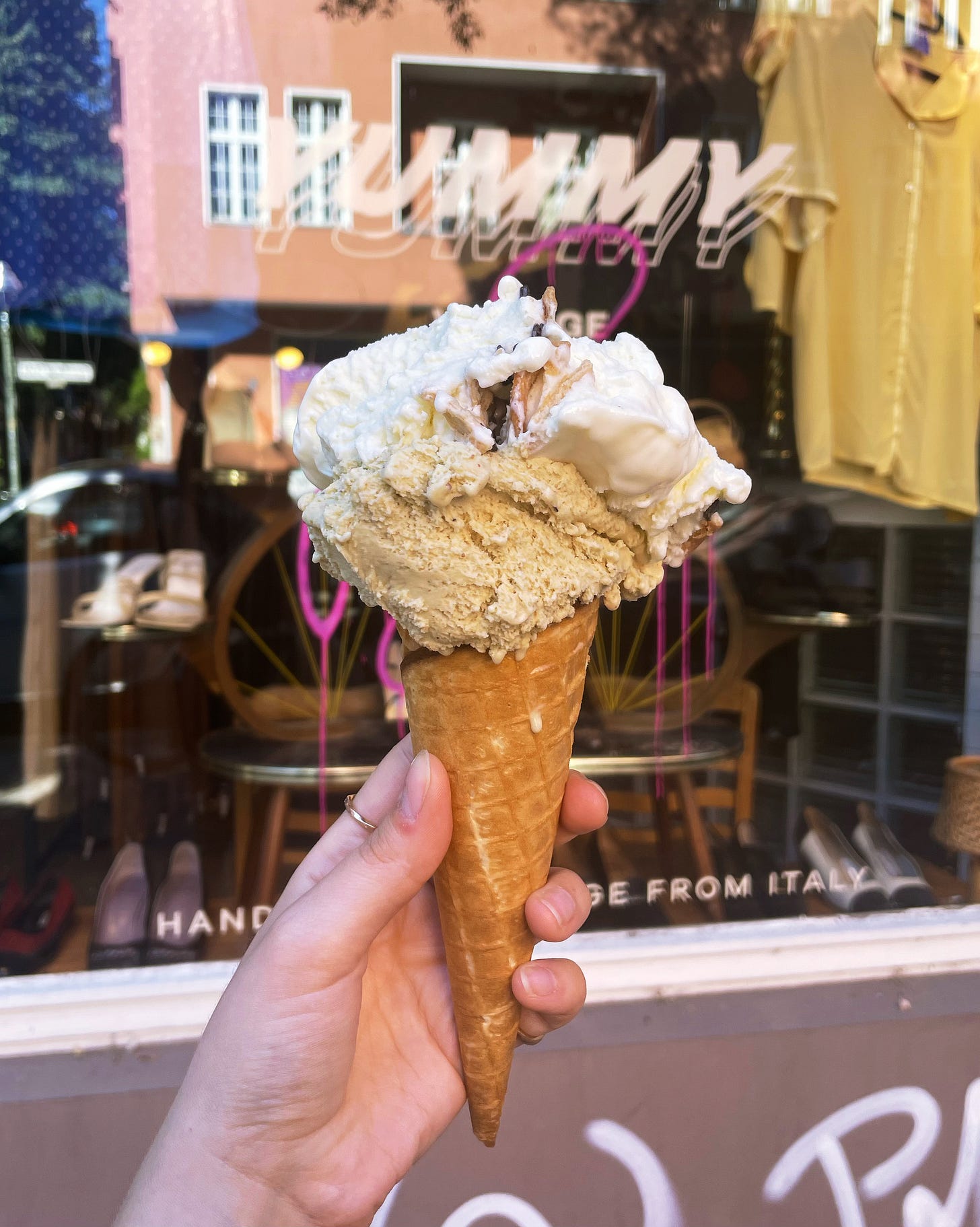The vulnerabilities of eating
Eating as rebellion, revelling in crumbs, and shedding moralistic rubbish—even when someone's watching.
There is nothing quite like the first bite of a pastry to spark unadulterated joy in me. First: shattering through carefully constructed layers of pastry and butter and pastry. It’s the pleasure of destruction, not dissimilar to ferociously ripping off the wrapping when you open your presents on Christmas morning. Then, watching a kaleidoscope of flaky specks of pastry flying over your lap and across the table. You can feel the remnants cling to the corners of your mouth as you smile at the chaos that you’ve wrecked with a single bite, flecks of croissant glued to your front teeth. Finally: surrendering. Decorum be damned, the only way to eat a pastry is to eat it with your whole face.
As an adult woman, eating with childish glee is an act of rebellion. The days of socially acceptable crumpled clothes and wearing stretched-out hair ties on your wrist are long gone: every aspect of our presentation risks revealing a character flaw. The small orange stain I discovered on my jeans this morning felt like a reminder of a moral shortcoming I have faced many times before, one I simply cannot compensate for. The morning I spilt a takeaway cup of coffee from Jolene on a white t-shirt, a juicy chicken wrap leaking onto the skirt of my satin pink dress, olive oil daringly dripping off a piece of bread onto a new skirt right before I put it in my mouth… I could go on. Sloppiness might be an endearing quality in a guy—I mean, who doesn’t love Nick Miller?—but it’s far from desirable in a woman.
It’s a topic a lot of my (girl)friends bring up frequently. Foods to avoid during dates, lunches you shouldn’t bring into the office, snacks you don’t want to be seen eating in public, and guilty pleasures exclusively dedicated to the privacy of your flat at night where no one will judge you. Big, rich, fatty, sweet foods are shameful– meant to be hidden, resisted, denied. Small, light, slim, meagre portions are encouraged and celebrated, held up as a display of control and discipline. I hear it in my colleague’s voice as she reaches for her second, maybe third biscuit of the day. ‘This is no good’, she says, her tone half-joking, half-self-deprecating, ‘I’ll have to go for a run later.’ She’s laughing, but it feels like a preemptive defense, as though she needs to let us know she’s aware of her supposed transgression—and that she’s already sentenced a suitable penance. It’s something I notice often among women: this habit of calling themselves out before anyone else can, as if to say, ‘I’m not deluded–I know this is bad.’
The intimacy of eating is a concept that I started thinking about more clearly when I met Lilli at my friend Eleonora’s birthday party last year. We instantly hit it off—we shared the same love for eating and cooking, an equal fascination with food. When I asked her if she enjoys hosting, she expressed that she actually doesn’t like eating or cooking with new friends. It’s not necessarily out of fear of judgement, like it is with my colleague, but the opposite. These acts feel supremely intimate to her, as they hold as lot of peace, joy and vulnerability for her. She’s protective of sharing those spaces with people she doesn’t yet trust or know very well, a sweet tenderness reserved for those closest to her.
Lilli’s hesitation isn’t unfounded. Most of us have felt the long-lasting impact of a careless throwaway remark at a family dinner, or a mean-spirited comment at school. I dreaded Christmas and similar get-togethers growing up, anticipating the squelching shame I would feel at my relatives praising my thinness or scrutinising how much I was eating. For others, experiences like the ‘lunchbox moment’ carried the pain of feeling alienated from their identity or anger at the ignorance of their classmates. A close friend once shared how she used to sit in the cafeteria, feeling the quiet ache of inadequacy at her too-small homemade sandwich as she watched her classmates unpack their fancy school lunches and colourful snacks that her family couldn’t afford. It goes to show how fragile the joy of food can be, shaped by the worlds we live in and the stories we carry.

What we eat, the way we choose to eat it, and how we feel about it reveal great truths about us. Our cultural heritage and economic background; our most significant relationships, the stories we tell ourselves, our greatest pleasures, and comfort zones; our fears and insecurities, deep-rooted shame and social conditioning. It allows us to express—or conceal—who we are, building a bridge to welcome someone in or keep them at a distance. Most of the time, it may feel like the choice is made for us—muscle reflex learnt from inherited patterns and shaped by those around us.
This past year, I’ve been trying to be more intentional about my own choices. Last week, it surprised me to realise how exposed I actually feel sometimes, eating in social settings. It was something I’d noticed before on many occasions, but had been unable to pin down and eventually attributed to general anxiety. It manifests in the way I obsessively graze my teeth for stray bits of food after every bite, or insistently pat away phantom splotches of sauce on the curves of my lips. It makes me look down to check my shirt again and again, unable to believe it remains intact. These compulsions drown out the world around me and tether me to self-consciousness, making me feel powerless and disconnected.
Thankfully, as someone with a history of disordered eating, I recognised this spiral for what it was: a lingering echo of the control and shame I once struggled with, creeping into a space that I’ve worked so hard to reclaim as joyful and nourishing. Food, for me, is meant to be a source of connection, comfort, and celebration—not something to cause fear or tiptoe around. This realisation has helped me to pause and ground myself in the moment.

This is where the radical act of eating with rapture comes in. It’s eating a pastry with your face when people around you are eating a croissant with a fork and knife. It’s walking through the streets of Berlin with a massive cone of ice cream dripping all over your skirt, giggling as you try to avoid the thick droplets in a strange little dance with yourself. It’s eating abundantly on a date and laughing joyfully between bites, forgetting I had lipstick on and choosing to be okay with whatever I looked like to him. It’s shrugging at the orange stain on my jeans and chucking them in the wash after one wear. It’s choosing to let go and lean into the messiness—I’ve got bigger fish to fry.







Wild words Sara. love hearing like minds 🫰🏿